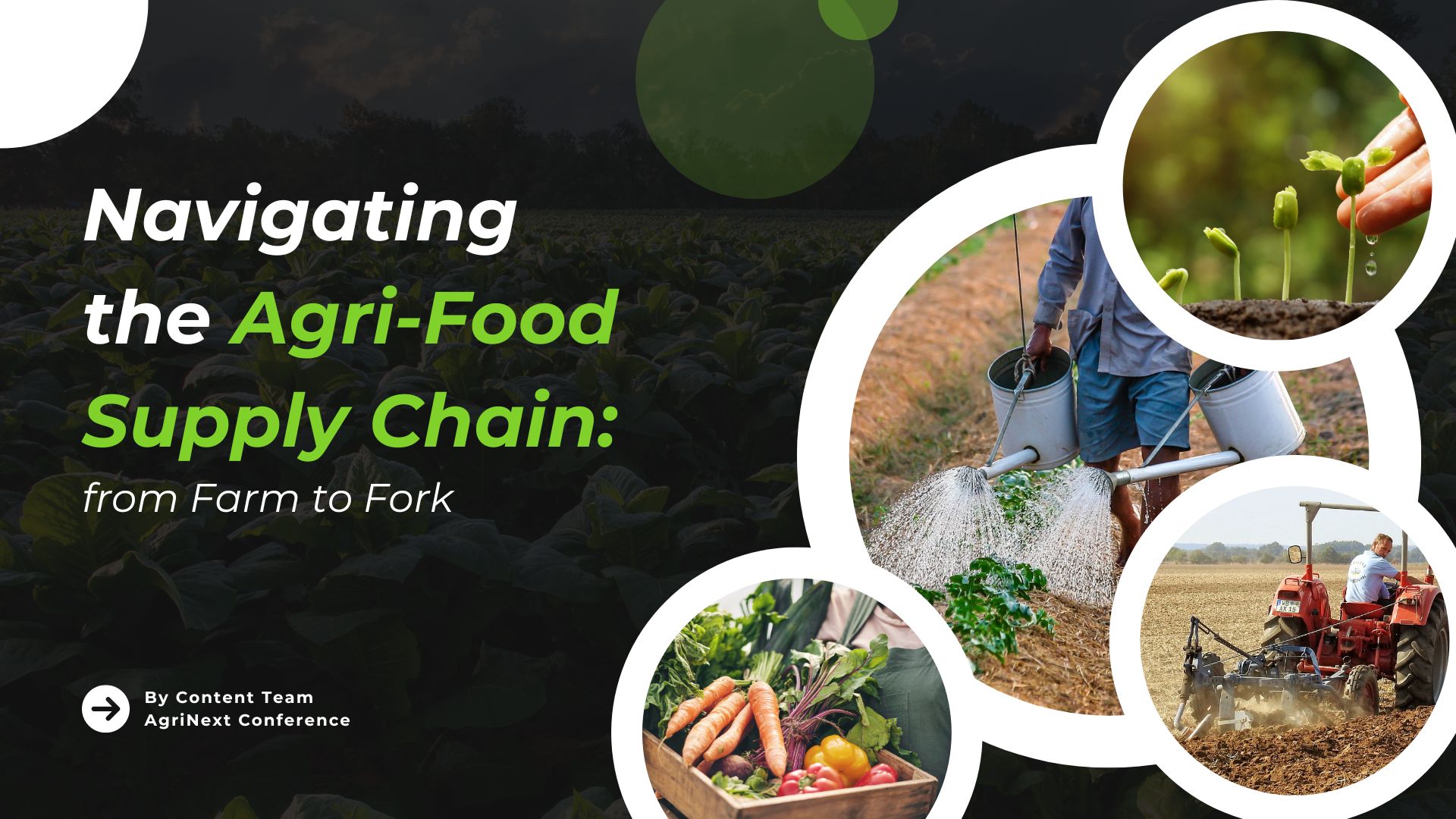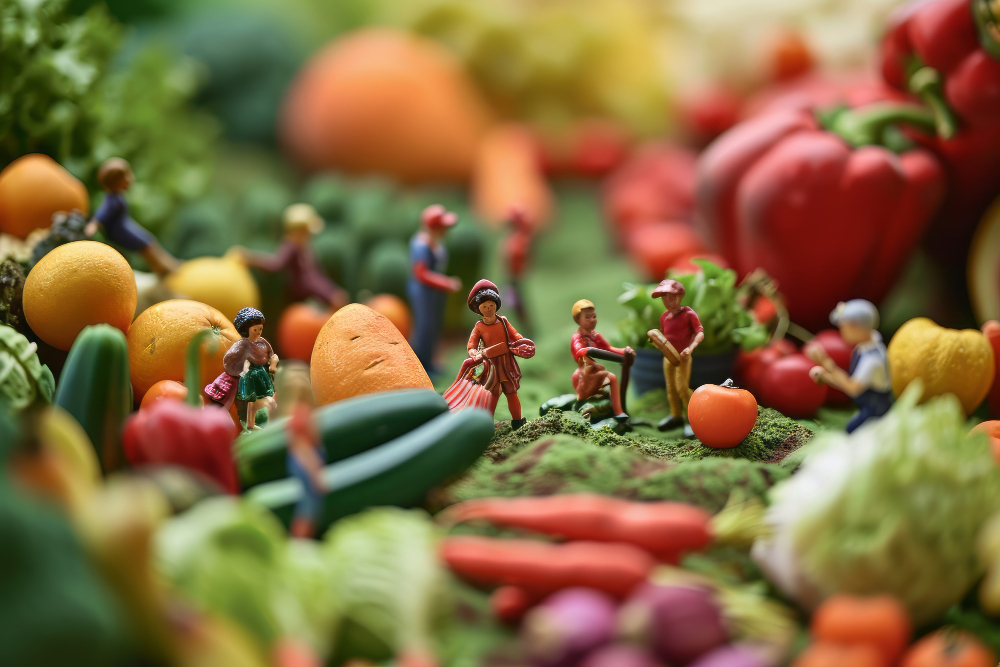
Introduction:
The agri-food supply chain is a complex network of interconnected processes and stakeholders that play a crucial role in bringing food from the farm to our plates. From production and processing to distribution and retail, each stage of the supply chain involves numerous contributors, technologies, and challenges. In this blog, we’ll explore the key components of the agri-food supply chain and the factors influencing its efficiency, resilience, and sustainability
Table of Contents
Primary Production (Agri-Food Supply Chain)
At the heart of the agri-food supply chain is primary production, where crops are grown and livestock are raised on farms and ranches. Farmers and producers employ a variety of techniques and technologies to cultivate crops, manage livestock, and optimize yields while ensuring environmental sustainability and animal welfare.

Processing and Manufacturing:
Once harvested, crops and livestock undergo processing and manufacturing to transform them into food products ready for consumption. This stage involves activities such as cleaning, sorting, milling, grinding, packaging, and preservation, carried out by food processing plants, mills, and manufacturing facilities.
Distribution and Logistics:
Distribution and logistics play a critical role in the agri-food supply chain, ensuring that food products reach their intended destinations in a timely and efficient manner. This stage involves transportation, warehousing, inventory management, and order fulfillment, facilitated by logistics companies, distributors, wholesalers, and retailers.
Retail and Consumer Markets:
The final stage of the agri-food supply chain involves retail and consumer markets, where food products are sold to end consumers through various channels such as supermarkets, grocery stores, farmers’ markets, restaurants, and online platforms. Retailers play a key role in marketing, promoting, and selling food products to meet consumer demand and preferences.
Challenges and Opportunities:
The agri-food supply chain faces numerous challenges, including food safety and quality concerns. The key challenges faced by the agri food supply chain are:
Supply Chain Disruptions:
The agri-food supply chain is susceptible to various disruptions, including natural disasters, extreme weather events, transportation obstruction, and geopolitical conflicts. These disruptions can disrupt production, transportation, and distribution networks, leading to delays, shortages, and price fluctuations. For example, the COVID-19 pandemic highlighted vulnerabilities in the supply chain, with disruptions in labor availability, transportation capacity, and market demand affecting food production and distribution globally.
Food Safety and Quality Assurance:
Ensuring food safety and quality throughout the supply chain is a significant challenge, particularly in light of increasing regulatory requirements, consumer expectations, and global trade complexities. Contamination risks, including microbial pathogens, chemical residues, and adulteration, pose threats to food safety and public health.
Additionally, maintaining product quality and freshness during transportation and storage can be challenging, especially for perishable foods such as fresh produce and dairy products.
Implementing robust food safety management systems, traceability technologies, and quality assurance protocols is essential to mitigate these risks and maintain consumer confidence in the food supply.
Technology and Innovation:
Technology and innovation are driving transformation in the agri-food supply chain, enabling stakeholders to improve efficiency, traceability, transparency, and sustainability. Technologies such as blockchain, IoT (Internet of Things), AI (Artificial Intelligence), and data analytics are being deployed to enhance production, processing, distribution, and retail operations.
Sustainability and Resilience:
Sustainability and resilience are key considerations in the agri-food supply chain, as stakeholders seek to minimize environmental impact, conserve natural resources, and build resilience to shocks and disruptions. Sustainable practices such as regenerative agriculture, organic farming, fair trade, and circular economy principles are gaining traction as consumers and businesses prioritize ethical and environmentally friendly food production and consumption.
Future Outlook:
Looking ahead, the agri-food supply chain is expected to continue evolving in response to changing consumer trends, technological advancements, regulatory requirements, and global challenges such as climate change and population growth. Collaboration, innovation, and adaptation will be essential for building a more efficient, resilient, and sustainable agri-food supply chain that can meet the needs of current and future generations.
In the farm-to-fork supply chain for fresh produce, several companies play key roles in different stages of the process. Here are some examples of companies involved in each stage:
Primary Production (Farming):
Earthbound Farm:
Known for its organic farming practices, Earthbound Farm grows a variety of organic fruits and vegetables on its farms across the United States. The company prioritizes sustainability and environmental stewardship in its farming operations.
Driscoll’s:
Driscoll’s is a leading producer of fresh berries, including strawberries, blueberries, raspberries, and blackberries.
Dole Food Company:
Dole is a global producer and marketer of fresh fruits and vegetables, including bananas, pineapples, and leafy greens.
Processing And Manufacturing:
Taylor Farms:
Taylor Farms is a leading supplier of fresh-cut fruits and vegetables, providing a wide range of packaged produce to retailers and foodservice providers.
Fresh Del Monte Produce:
Fresh Del Monte Produce is a multinational producer and distributor of fresh and prepared fruits and vegetables.
SunOpta:
SunOpta is a leading provider of organic and non-GMO food products, including fresh fruits and vegetables, packaged salads, and fruit snacks.
Distribution and Logistics:
Sysco Corporation:
Sysco is one of the largest foodservice distributors in the world, supplying restaurants, hotels, healthcare facilities, and other customers with a diverse range of food products, including fresh produce.
C.H. Robinson:
C.H. Robinson is a global logistics and transportation company that specializes in fresh produce logistics.
Lineage Logistics:
Lineage Logistics is a leading provider of temperature-controlled logistics and cold storage services for perishable goods, including fresh produce.
Retail and Consumer Markets:
Whole Foods Market:
Whole Foods Market is a prominent retailer of organic and natural foods, including fresh produce sourced from local and regional growers.
Tesco:
Tesco is a multinational retailer that operates supermarkets, hypermarkets, and convenience stores in multiple country.
Walmart:
Walmart is one of the world’s largest retailers, with a diverse range of products, including fresh produce.
Technology and Innovation:
IBM Food Trust:
IBM Food Trust is a blockchain-based platform that enables transparency and traceability in the food supply chain.
AgBiome:
AgBiome is an agricultural technology company that develops biological solutions for crop protection and soil health.
Zest Labs:
The company offers solutions that use IoT sensors and data analytics to monitor and optimize the freshness and shelf life of food products throughout the supply chain.
Sustainability and Resilience:
Mars, Incorporated:
Mars, Incorporated is committed to sustainability and resilience in its agricultural supply chain, including sourcing of raw materials such as cocoa, rice, and vegetables.
Organic Valley:
Organic Valley is a cooperative of organic farmers that produces and markets organic dairy, meat, and produce products.
NatureSweet:
NatureSweet is a grower-owned producer of premium tomatoes, including cherry and grape tomatoes.
These are just a few examples of companies involved in the farm-to-fork supply chain for fresh produce. Many other companies, including growers, processors, distributors, retailers, and technology providers, also play important roles in ensuring the availability, safety, and quality of fresh produce for consumers worldwide.
Conclusion:
The agri-food supply chain is a dynamic and interconnected system that plays a vital role in ensuring food security, economic prosperity, and environmental sustainability. By understanding the complexities and challenges of the supply chain and embracing innovation and collaboration, stakeholders can work together to create a more efficient, resilient, and sustainable food system that benefits all.
